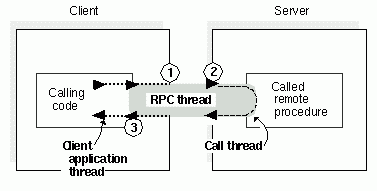
DCE RPC uses and supports the synchronous cancel capability provided by POSIX threads (pthreads). A cancel is a mechanism by which a thread informs another thread (the canceled thread) to terminate as soon as possible. Cancels operate on the RPC thread exactly as they would on a local thread, except for an application-specified, cancel-timeout period. A cancel-timeout period is an optional value that limits the amount of time the canceled RPC thread has before it releases control.
During a remote procedure call, if its thread is canceled and the cancel-timeout period expires before the call returns, the calling thread regains control and the call is orphaned at the server. An orphaned call may continue to execute in the call thread. However, the call thread is no longer part of the RPC thread, and the orphaned call is unable to return results to the client.
A client application thread can cancel any other client application thread in the same process (it is possible, but unlikely, for a thread to cancel itself.) While executing as part of an RPC thread, a call thread can be canceled only by a client application thread.
A cancel goes through several phases. the following figure shows where each of these phases occur.
Phases of a Cancel in an RPC Thread

The phases of a cancel in the preceding figure include the following:
1. A cancel that becomes pending at the client application thread at the start of or during a remote procedure call becomes pending for the entire RPC thread. Thus, while still part of the RPC thread, the call thread also has this cancel pending.
2. If the call thread of an RPC thread makes a cancelable call when cancels are not deferred and a cancel is pending, the cancel exception is raised.
3. The RPC thread returns to the canceled client application thread with one of the following outcomes:
· If a cancel exception has not been taken, the RPC thread returns normal call results (output arguments, return value, or both) with a pending cancel.
· If the remote procedure is using an exception handler, a cancel exception can be handled. The procedure resumes, and the RPC thread returns normal call results without pending any cancel.
· If the remote procedure failed to handle a raised cancel exception, the RPC thread returns with the cancel exception still raised. This is returned as a fault.
· If the cancel-timeout period expires, the RPC thread returns either a cancel-timeout exception or status code, depending on how the application sets up its error handling. This is true for all cases where any abnormal termination is returned.